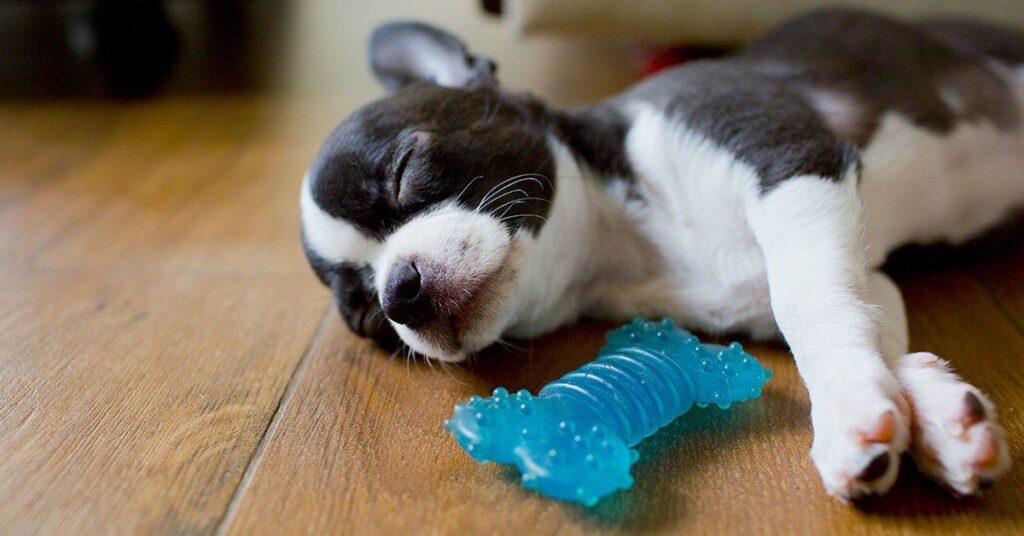You’ve finally brought home your new puppy, and you can’t wait to spend lots of time with your new love. But, surprise! This little bundle of joy sleeps a lot. Is this normal?.
The majority of new puppy owners are curious about how much their pet should sleep. Let’s look at a typical puppy sleep schedule and the advantages of squeezing in a few extra hours of sleep to determine how much is too much and how little is too little.
How to establish a sleeping schedule for your puppy
Establish a sleeping space: Where will your puppy be sleeping? Think about a location that is close to you or where you can see your pup, as they will likely feel frightened in a strange place. Try to create a space that is quiet and dark so your dog can unwind and feel at ease.
Hydration and bathroom breaks: Your puppy will sleep better at night if it doesn’t need to get up too often. Set an alarm because most puppies will need to go potty every two hours. When your dog is nearby, it will be simpler for you to hear them when they become agitated.
Take your puppy outside for potty breaks right before bedtime and right after they wake up to avoid accidents in the house. This goes a long way!.
Healthy dog food gives your puppy the energy they need to support their rapidly expanding bodies, strengthen their bones, and focus on their training, which in turn promotes better sleep. Your child will play and sleep better if they eat a healthy diet!
Routines are crucial because they help your puppy learn a sleeping schedule more quickly. Similar to many people, dogs benefit from routines because they lower anxiety. Try to keep the schedule consistent each day, but if you must alter it for a last-minute event or trip, adjust it so they still get the necessary amount of sleep.

How to set a sleep schedule for a puppy?
We’ll first calculate how much sleep your puppy gets at night, and then we’ll spread out the rest of the sleep time throughout the day. Dogs between the ages of 7 and 16 weeks can typically sleep for 6 to 8 hours, but they still need to go potty at night.
As a result, if your dog awakens at night, it needs to urinate. During this time, do not play or pay attention to it.
But there is one problem with sleeping at night. Puppy tucking is frequently challenging, and they don’t like to sleep alone. So your job is to:
The best time for the puppy to go to bed is one hour after meals and after taking a nighttime potty walk. It doesn’t matter what time it is; you should create a schedule that works for you. Although young puppies can’t sleep as long as people, you can train your dog to go to bed and get up with you after 16 weeks.
Dogs wake up as the sun rises. Therefore, if you want to delay the wake-up time, place the dog bed in a darker area.
Typically, you won’t have to do anything to train your puppy to go to sleep during the day. They will do it anyway. What your job is:
It’s advisable to make sure your puppy takes several two-hour naps throughout the day, even though the daytime sleep schedule will be flexible. Their number and the total amount of sleep in a 24-hour period vary with age:
Let’s create a general daily schedule for a 12-week-old puppy in accordance with all the advice in this article:
Make sure your pet has a cozy, peaceful place to sleep, and follow its schedule. Then everyone in the house will sleep peacefully!.
How much do puppies sleep?
Puppies are entirely dependent on their mothers when they are born. They essentially have no hearing, sight, or control over their muscle movement. They sleep for 22 hours per day, or roughly 90% of the time, and then nurse for the remaining 10%. Lucky pups!.
Puppies sleep less and explore the world more as they grow. Your dog’s sleep requirements will depend on their breed, age, diet, and level of activity, but here is a typical overview:
A puppy will sleep for about 20 hours a day at 8 weeks of age.
By the time it is 10–12 weeks old, puppies sleep 18–20 hours every day.
A puppy will sleep for about 18 hours a day between 14 and 16 weeks.
This period, between 16 and 18 weeks, is crucial for your puppy’s development. They must master their feeding routine, socialization, and fundamental training during this crucial period, to name a few. They need a lot of sleep for their new routines and behaviors to stick.
Puppies and older dogs will adjust to 12 to 14 hours of sleep per day. If you’re curious about where your dog falls on the dog age chart, check it out here.
Puppies take 30-minute to two-hour naps spaced out throughout the day and night. Young puppies will nap more frequently, frequently every hour. As they grow, frequency of nap time will dwindle.
Dogs are polyphasic sleepers, which means they nap or sleep for short periods throughout the day and night. As dogs age, they become diurnal sleepers, which means they sleep for longer periods during the darker parts of the day, with naps and activity happening during daylight hours.
Humans are monophasic sleepers, meaning we sleep during the night, and night alone.
Because they develop their bones and muscles more slowly than small dog breeds and need more sleep to do so, large dog breeds get tired easily. Additionally, they need dog food made specifically for large breeds to nourish those rapidly developing bodies.

FAQ
How much should my 10 month old puppy sleep during the day?
Despite being little balls of energy, puppies typically sleep 18 to 20 hours per day.
How much activity does a 10 month old puppy need?
If you’re wondering how much exercise my puppy needs, a general rule of thumb is to multiply your puppy’s age in months by five to determine how long each session should last. This is based on two daily walks, on average.
What should I expect from my 10 month old puppy?
Around the 10- to 12-month point, growth and development start to slow. However, your puppy’s mental and emotional growth doesn’t stop at age one. Your dog still requires your presence to provide direction, praise good behavior, facilitate socialization opportunities, and provide both physical and mental stimulation.
Is a 10 month old dog still a puppy?
While their bones are still developing, which can take anywhere from six to twenty-four months, puppies continue to grow in height and size until they are one year old, when they are officially classified as adult dogs. How tall they will grow to be as adults depends on their skeletal development.